

2024/25 concert season
Filmed live at the Southbank Centre’s Royal Festival Hall



2024/25 concert season
Filmed live at the Southbank Centre’s Royal Festival Hall
Broadcast Sunday 30 March 2025
Digital concert programme
Grieg Piano Concerto
R Strauss An Alpine Symphony
Edward Gardner conductor
Generously supported by Aud Jebsen
Steven Osborne piano
Pieter Schoeman* Leader
Chair supported by Neil Westreich
Alice Ivy-Pemberton Co-Leader
Vesselin Gellev Sub-Leader
Kate Oswin
Chair supported by Eric Tomsett
Lasma Taimina
Chair supported by Irina Gofman
& Mr Rodrik V. G. Cave
Minn Majoe
Chair supported by Dr Alex & Maria Chan
Cassandra Hamilton
Martin Höhmann
Thomas Eisner
Chair supported by Ryze Power
Katalin Varnagy
Yang Zhang
Nilufar Alimaksumova
Camille Buitenhuis
Alison Strange
Rasa Zukauskaite
Kay Chappell
Tania Mazzetti Principal
Chair supported by The Candide
Trust
Emma Oldfield Co-Principal
Claudia Tarrant-Matthews
Nynke Hijlkema
Fiona Higham
Chair supported by David & Yi
Buckley
Kate Birchall
Nancy Elan
Sioni Williams
Sarah Thornett
Paula Clifton-Everest
Lyrit Milgram
Sheila Law
Emma Purslow
José Nuno Cabrita Matias
Violas
Konstantin Boyarsky
Guest Principal
Martin Wray
Chair supported by David & Bettina
Harden
Laura Vallejo
Katharine Leek
Benedetto Pollani
Kate De Campos
Terry Nettle
Richard Cookson
Jisu Song
Jill Valentine
Martin Fenn
Delyth John
Kristina Blaumane Principal
Chair supported by Bianca & Stuart
Roden
Waynne Kwon
Francis Bucknall
Auriol Evans
Tom Roff
George Hoult
Sibylle Hentschel
Iain Ward
Colin Alexander
Julia Morneweg
Double Basses
Sebastian Pennar* Principal
George Peniston
Tom Walley
Chair supported by William & Alex de Winton
Laura Murphy
Chair supported by Ian Ferguson & Susan Tranter
Charlotte Kerbegian
Lowri Estell
Emma Prince
Siret Lust
Flutes
Juliette Bausor Principal
Ian Mullin
Stewart McIlwham*
Katie Bicknell
Piccolos
Stewart McIlwham* Principal
Katie Bicknell
Oboes
Ian Hardwick* Principal
Alice Munday
Sue Böhling*
Cor Anglais
Sue Böhling* Principal
Chair supported by Dr Barry Grimaldi
Heckelphone
John McDougall
Clarinets
Benjamin Mellefont* Principal
Chair supported by Sir Nigel Boardman & Prof. Lynda Gratton
Thomas Watmough
James Maltby
Paul Richards*
E-flat Clarinet
Thomas Watmough Principal Chair supported by Roger Greenwood
Bass Clarinet
Paul Richards* Principal
Bassoons
Jonathan Davies* Principal
Chair supported by Sir Simon Robey
Helen Storey*
Chair supported by Friends of the Orchestra
Stuart Russell
Simon Estell*
Contrabassoon
Simon Estell* Principal
Horns
John Ryan* Principal
Annemarie Federle Principal
Chair supported by Victoria Robey CBE
Martin Hobbs
Mark Vines Co-Principal
Gareth Mollison
Oliver Johnson
Elise Campbell
Duncan Fuller
Jonathan Farey
Offstage Horns
Ben Hulme
Timothy Ellis
Alec Ross
Joseph Ryan
Hannah Williams
Andrew Budden
Zachary Hayward
Duncan Fuller
Jonathan Farey
Trumpets
Paul Beniston* Principal
Tom Nielsen Co-Principal
Anne McAneney*
Chair supported in memory of Peter Coe
Tom Watts
David Hilton
Offstage Trumpets
Tony Cross
Joe Skypala
Trombones
Mark Templeton* Principal Chair supported by William & Alex de Winton
David Whitehouse
Offstage Trombones
Andrew Connington
Jamie Tweed
Bass Trombones
Lyndon Meredith Principal Simon Minshall
Tubas
Lee Tsarmaklis* Principal
Chair supported by William & Alex de Winton
James Tavares
Timpani
Simon Carrington* Principal Chair supported by Victoria Robey CBE
Jeremy Cornes
Percussion
Andrew Barclay* Principal Chair supported by Gill & Garf Collins
Karen Hutt Co-Principal
Oliver Yates
Feargus Brennan
Harps
Sue Blair Guest Principal Anneke Hodnett
Celeste
Catherine Edwards
Organ
Richard Gowers
Assistant Conductor
Matthew Lynch
*Professor at a London conservatoire
© Mark Allan
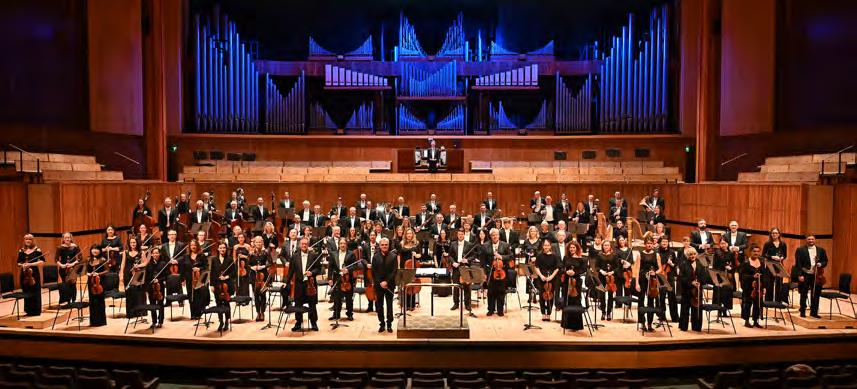
Uniquely groundbreaking and exhilarating to watch and hear, the London Philharmonic Orchestra has been celebrated as one of the world’s great orchestras since Sir Thomas Beecham founded it in 1932. Our mission is to share wonder with the modern world through the power of orchestral music, which we accomplish through live performances, online, and an extensive education and community programme, cementing our position as a leading orchestra for the 21st century.
Our home is at the Southbank Centre’s Royal Festival Hall, where we’re at the beating heart of London’s cultural life. You’ll also find us at our resident venues in Brighton, Eastbourne and Saffron Walden, and on tour worldwide. In 2024 we celebrated 60 years as Resident Symphony Orchestra at Glyndebourne Festival Opera, combining the magic of opera with Glyndebourne’s glorious setting in the Sussex countryside.
Everyone will have heard the Grammy-nominated London Philharmonic Orchestra, whether it’s playing the world’s National Anthems for every medal ceremony of the London 2012 Olympics and Paralympics, our iconic recording with Pavarotti that made Nessun Dorma a global football anthem, or closing the flotilla at The Queen’s Thames Diamond Jubilee Pageant. And you’ll almost certainly have heard us on the soundtracks for major films including The Lord of the Rings
We’re one of the world’s most-streamed orchestras, with over 15 million plays of our content each month. In 2023 we were the most successful orchestra worldwide on YouTube, TikTok and Instagram, with over 1.1m followers across all platforms, and in spring 2024 we featured in a TV documentary series on Sky Arts: ‘Backstage with the London Philharmonic Orchestra’, still available to watch via Now TV. During 2024/25 we’re once again working with Marquee TV to broadcast selected live concerts to enjoy from your own living room.
Our Principal Conductors have included some of the greatest historic names like Sir Adrian Boult, Bernard Haitink, Klaus Tennstedt and Kurt Masur. In 2021 Edward Gardner became our 13th Principal Conductor, and Vladimir Jurowski became Conductor Emeritus in recognition of his impact as Principal Conductor from 2007–21. Karina Canellakis is our current Principal Guest Conductor, and Tania León our Composer-in-Residence.
We’re committed to nurturing the next generation of musicians and music-lovers: we love seeing the joy of children and families experiencing their first musical moments, and we’re passionate about inspiring schools and teachers through dedicated concerts, workshops,
resources and training. Reflecting our values of collaboration and inclusivity, our OrchLab and Open Sound Ensemble projects offer music-making opportunities for adults and young people with disabilities and special educational needs.
Today’s young instrumentalists are the orchestra members of the future, and we have a number of opportunities to support their progression. Our LPO Junior Artists programme leads the way in creating pathways into the profession for young artists from under-represented communities, and our LPO Young Composers and Foyle Future Firsts schemes support the next generation of professional musicians, bridging the transition from education to professional careers. We also recently launched the LPO Conducting Fellowship, supporting the development of two outstanding early-career conductors from backgrounds under-represented in the profession.
Principal Conductor Edward Gardner leads the Orchestra in an exciting 2024/25 season, with soloists including Joyce DiDonato, Leif Ove Andsnes, Patricia Kopatchinskaja, Víkingur Ólafsson and Isabelle Faust, and works including Strauss’s Alpine Symphony, Ravel’s Daphnis and Chloe and Mahler’s Eighth Symphony. Principal Guest Conductor Karina Canellakis joins us for three concerts including Bruckner’s Fourth Symphony, Tchaikovsky’s Sixth Symphony, and Mozart with pianist Benjamin Grosvenor. We’ll also welcome back Conductor Emeritus Vladimir Jurowski, as well as guest conductors including Mark Elder, Lidiya Yankovskaya, Robin Ticciati and Kevin John Edusei.
Throughout the season we’ll explore the relationship between music and memory in our ‘Moments Remembered’ series, featuring works like Beethoven’s ‘Eroica’ Symphony, Strauss’s Metamorphosen and John Adams’s On the Transmigration of Souls. During the season there’ll be the chance to hear brand new works by composers including Freya Waley-Cohen and David Sawer, as well as performances by renowned soloists violinist Gidon Kremer, sarod player Amjad Ali Khan, soprano Renée Fleming and many more. The season also features tours to Japan, the USA, China and across Europe, as well as a calendar bursting with performances and community events in our Brighton, Eastbourne and Saffron Walden residencies.

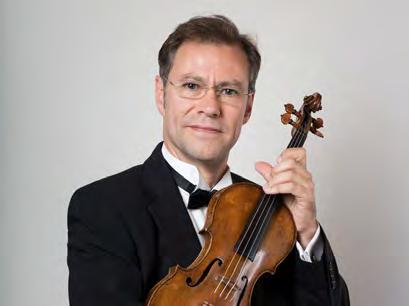
Pieter Schoeman was appointed Leader of the London Philharmonic Orchestra in 2008, having previously been Co-Leader since 2002. He is also a Professor of Violin at Trinity Laban Conservatoire of Music & Dance.
Pieter has performed worldwide as a soloist and recitalist in such famous halls as the Concertgebouw in Amsterdam, Moscow’s Rachmaninoff Hall, Capella Hall in St Petersburg, Staatsbibliothek in Berlin, Hollywood Bowl in Los Angeles and the Southbank Centre’s Royal Festival Hall. As a chamber musician he regularly appears at London’s prestigious Wigmore Hall. His chamber music partners have included Anne-Sophie Mutter, Veronika Eberle, Patricia Kopatchinskaja, Boris Garlitsky, Jean-Guihen Queyras, Yannick Nézet-Séguin, Martin Helmchen and Julia Fischer.
Pieter has performed numerous times as a soloist with the London Philharmonic Orchestra. Highlights have included an appearance as both conductor and soloist in Vivaldi’s Four Seasons at the Royal Festival Hall, the Brahms Double Concerto with Kristina Blaumane, Florence Price’s Violin Concerto No. 2, and the Britten Double Concerto with Alexander Zemtsov, which was recorded and released on the LPO Label to great critical acclaim.
Pieter has appeared as Guest Leader with the BBC, Barcelona, Bordeaux, Lyon and Baltimore symphony orchestras; the Rotterdam and BBC Philharmonic orchestras; and the Leipzig Gewandhaus Orchestra.
Pieter’s chair in the LPO is generously supported by Neil Westreich.
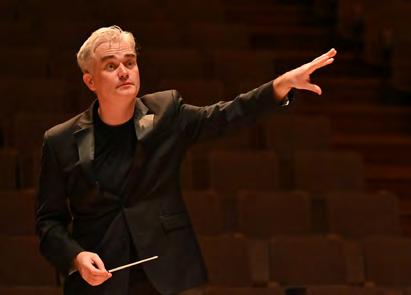
Edward Gardner has been Principal Conductor of the London Philharmonic Orchestra since September 2021, recently extending his contract until at least 2028. He is also Music Director of the Norwegian Opera & Ballet, and Honorary Conductor of the Bergen Philharmonic Orchestra, following his tenure as Chief Conductor from 2015–24.
This season – his fourth as Principal Conductor –Edward conducts nine LPO concerts at the Royal Festival Hall. In October 2024 he and the Orchestra embarked on a major US tour with celebrated violinists Patricia Kopatchinskaja and Randall Goosby, earning resounding praise throughout. This spring at the Royal Festival Hall, he presents works including Strauss’s mighty Alpine Symphony, Ravel’s Daphnis and Chloe and Mahler’s Symphony No. 8.
Edward opened his inaugural season as Music Director of the Norwegian Opera & Ballet with concert performances of Wagner’s The Flying Dutchman and Mahler’s ‘Resurrection’ Symphony. He followed this with a fully-staged production of Verdi’s La traviata, and later this spring will conduct Janáček’s The Cunning Little Vixen, following earlier productions of Bartók’s Bluebeard’s Castle, Zemlinsky’s A Florentine Tragedy and Verdi’s Un ballo in maschera
In demand as a guest conductor, this season Edward appears with the Bavarian Radio Symphony, Frankfurt Radio, Dallas Symphony, New World Symphony, Minnesota, Seoul Philharmonic, Sydney Symphony and West Australian Symphony orchestras. Debuts in recent seasons have included with the New York Philharmonic, the Philadelphia and Cleveland Orchestras, and the San Francisco Symphony, Staatskapelle Berlin, Berlin
Radio Symphony and Vienna Symphony orchestras. In the UK, he has had longstanding collaborations with the City of Birmingham Symphony Orchestra, where he was Principal Guest Conductor from 2010-16, and the BBC Symphony Orchestra, whom he has conducted at both the First and Last Night of the BBC Proms.
In February 2025 Edward returned to the Royal Opera House to conduct the world premiere of Mark-Anthony Turnage’s Festen, and in June he returns to the Bavarian State Opera for Rusalka, following his debut with Peter Grimes in 2022 and Otello in 2023. Music Director of English National Opera for eight years (2007–15), Edward has also built a strong relationship with New York’s Metropolitan Opera, with productions of The Damnation of Faust, Carmen, Don Giovanni, Der Rosenkavalier and Werther. Elsewhere, he has conducted at La Scala, Chicago Lyric Opera, Glyndebourne Festival Opera and Opéra National de Paris.
In February 2024, the LPO Label released Berlioz’s The Damnation of Faust with Edward Gardner, recorded live in February 2023. This followed his recording of Tippett’s The Midsummer Marriage, which won the 2023 Gramophone Opera Award. A second Tippett disc, featuring the Second Symphony and the Piano Concerto with Steven Osborne, was released in November 2024. In spring 2024 Edward and the LPO featured in a documentary series on Sky Arts: ‘Backstage with the London Philharmonic Orchestra’, still available to watch on Now TV.
A passionate supporter of young talent, Edward founded the Hallé Youth Orchestra in 2002 and regularly conducts the National Youth Orchestra of Great Britain. He has a close relationship with the Juilliard School of Music, and with the Royal Academy of Music who appointed him their inaugural Sir Charles Mackerras Conducting Chair in 2014.
Born in Gloucester in 1974, Edward was educated at the University of Cambridge and the Royal Academy of Music, and gained early recognition as Assistant Conductor of the Hallé and Music Director of Glyndebourne Touring Opera. His many accolades include the Royal Philharmonic Society Conductor of the Year Award (2008), an Olivier Award for Outstanding Achievement in Opera (2009) and an OBE for Services to Music in The Queen’s Birthday Honours (2012).
Edward Gardner’s position at the LPO is generously supported by Aud Jebsen.

Steven Osborne’s musical insight and integrity underpin idiomatic interpretations of varied repertoire that have won him fans around the world. The extent of his range is demonstrated by his 41 recordings for Hyperion, which have earned numerous awards, and he was made OBE for his services to music in The Queen’s New Year Honours 2022.
Steven last appeared with the LPO in January 2023, when he performed Tippett’s Piano Concerto under Edward Gardner at the Royal Festival Hall. The performance was later released on the LPO’s own label, paired with Tippett’s Symphony No. 2, receiving widespread critical acclaim (LPO–0129).
A thoughtful and curious musician, Steven Osborne has served as Artist-in-Residence at Wigmore Hall and Bath International Music Festival, and is often invited to curate festivals, including at Antwerp’s DeSingel and for the Antwerp Symphony Orchestra. He is a regular visitor to the BBC Proms, having performed there 15 times. In 2024 he gave two concerts in the same week, the first in Messiaen’s TurangalîlaSymphonie with the BBC Philharmonic under Nicholas Collon, with whom he performs it later in the season with Finnish Radio Symphony Orchestra. He then performed Gershwin’s Rhapsody in Blue with the Sinfonia of London.
Steven has a lifelong interest in jazz and often improvises in concerts, bringing this spontaneity and freedom to all his interpretations, and performing his own transcriptions as encores. This season he tours the US with a recital programme that includes his own jazz transcriptions and improvisations. Other performances this season include Ryan Wigglesworth’s
Piano Concerto, with the composer conducting the Tampere Philharmonic Orchestra; Britten with the Deutsche Radio Philharmonie; Grieg with the City of Birmingham Symphony Orchestra; and a recital at the Aspen Festival. He also tours the US in a duo with violinist Benjamin Beilman.
Steven has performed in the world’s most prestigious venues, including the Vienna Konzerthaus, Amsterdam Concertgebouw, Berlin Philharmonie, Hamburg Elbphilharmonie, Tokyo’s Suntory Hall and Kennedy Center Washington, and is a regular guest at both Lincoln Center and Wigmore Hall. He has worked with major orchestras around the globe, most recently the Czech Philharmonic/Bychkov, Israel Philharmonic/ Petrenko, Dresden Philharmonic/Runnicles, Seattle Symphony and Philharmonia/Rouvali, Deutsches Symphonie Orchester Berlin, Oslo Philharmonic, London Symphony, Yomiuri Nippon Symphony and Seattle Symphony.
He has been a Hyperion recording artist since 1998, with releases spanning Beethoven, Schubert, Ravel, Liszt, Stravinsky, Prokofiev, Rachmaninov, Medtner, Messiaen, Britten, Tippett, Crumb and Feldman, and winning numerous awards around the world. His most recent addition, at the end of 2023, was Debussy’s Études and Pour le piano, given five stars by BBC Music Magazine and described as ‘full of superlatives’. In 2024 he returned to the studio with Paul Lewis to record twopiano repertoire by Schubert, Schumann and Brahms. Steven Osborne was born in Scotland and studied at St Mary’s Music School in Edinburgh and the Royal Northern College of Music. He is Visiting Professor at the Royal Academy of Music and the Royal Conservatoire of Scotland; Patron of both the Scottish International Piano Competition and the Lammermuir Festival; and was elected a Fellow of the Royal Society of Edinburgh in 2014.
1 Allegro molto moderato
2 Adagio
3 Allegro moderato molto e marcato – Poco animato
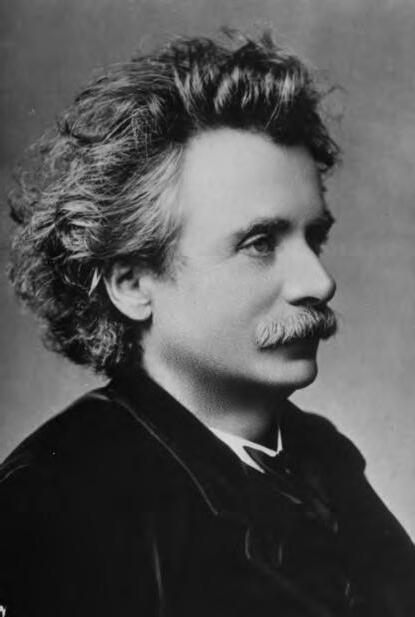
In 1870, Grieg had an unforgettable experience. In Rome he met Liszt, the greatest virtuoso pianist of his day, who played through Grieg’s newly completed Piano Concerto. At the end of the finale, where the second theme returns in triumph but with one note tellingly altered, Liszt leapt up from the keyboard, threw his arms wide and exclaimed, ‘G, G, not G sharp! Splendid!’ And when he handed back the score, Liszt exclaimed, ‘Keep going. You’ve got what it takes – don’t let them intimidate you!’
Understandably, this did wonders for the 25-year-old Grieg’s confidence. And yet the path he was eventually to follow led him in rather different directions. Grieg never again attempted anything on as grand a scale as the Piano Concerto. Apart from his theatre scores for the plays Sigurd Jorsalfar and Peer Gynt, the only substantial multi-movement works he produced after the Concerto were for chamber ensembles. Grieg must have realised that his real talent was for creating miniatures rather than grand symphonic constructions. In later years he toyed with the idea of writing another concerto, but only sketches survived.
But does this mean that the Piano Concerto is anything other than a masterpiece? However captivating the musical invention, say some critics, the Concerto is somewhat mechanical in its use of form: recapitulations, for example, tend to be literal, and development of the leading ideas (when it occurs) tends to be formulaic. There is some justice in this, and yet in a sympathetic performance it hardly seems to matter. Not only are the
tunes all top-drawer Grieg, there are moments of exceptional beauty – especially the haunting soft orchestral introduction to the central slow movement; and the return and transformation of the finale’s big tune when the piano takes it up at the end of the Concerto is a superb dramatic stroke.
The beginning of the Piano Concerto deservedly remains one of the most famous openings to a concerto in the repertory: a timpani crescendo, a shout for the full orchestra, then a series of downward cascading figures for the piano. After this the movement is based on two main themes: the first introduced quietly by winds, answered by strings; the second a singing melody first heard on cellos. The big cadenza near
the end of the movement is a splendid tour de force, and the return of the Concerto’s opening figures to round off the movement is superbly engineered. After the magical hushed orchestral introduction, the songlike Adagio is dominated by the piano, not so much developing the melodies as decorating them. This leads without a break to the finale: full of vigorous folk-dance tunes at first, then introducing the Concerto’s ‘star tune’ in its slower middle section on solo flute. Grieg builds up the excitement impressively in the faster coda, to the point where the flute tune returns first in full orchestral splendour, then with that telling alteration – G sharp to G – in rich harmonisation on the piano. No wonder it made Liszt shout ‘Splendid!’
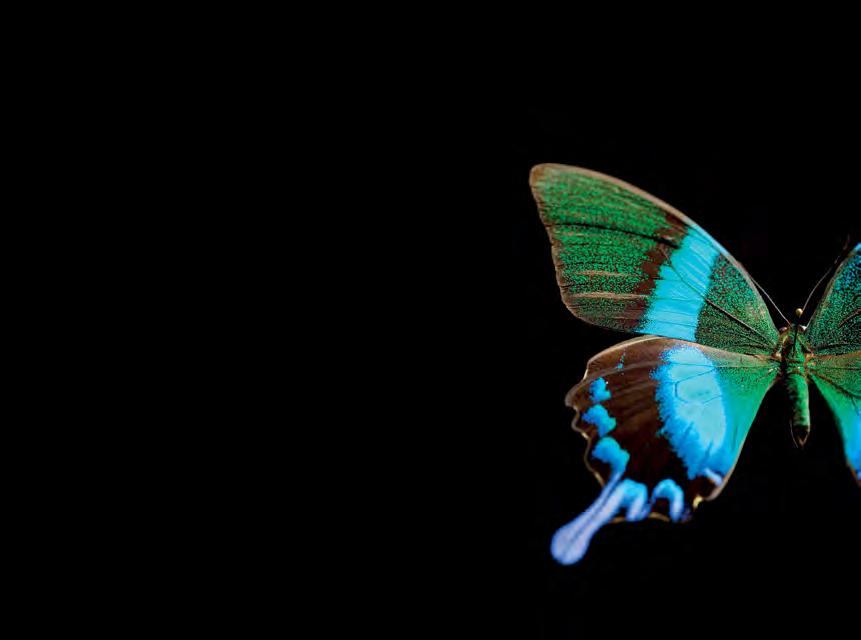

Tippett Piano Concerto Tippett Symphony No. 2
Edward Gardner conductor
Steven Osborne piano
London Philharmonic Orchestra
Recorded live in concert at the Royal Festival Hall
‘ It would be hard to imagine a more convincing account of the Piano Concerto than the one Steven Osborne conjured here.’ ★★★★
The Guardian (concert review)



1864–1949
Nacht (Night)
Sonnenaufgang (Sunrise)
Der Anstieg (The ascent)
Eintritt in den Wald (Entering the wood)
Wanderung neben dem Bache (Wandering by the stream)
Am Wasserfall (By the waterfall)
Erscheinung (Apparition)
Auf blumige Wiesen (In flowery meadows)
Auf der Alm (On a mountain pasture)
Durch Dickicht und Gestrüpp auf Irrwegen (Wrong turns through thicket and undergrowth)
Auf dem Gletscher (On the glacier)
Gefahrvolle Augenblicke (Perilous moments)
Auf dem Gipfel (On the summit)
Vision
Nebel steigen auf (Mists rise)
Die Sonne verdüstert sich allmählich (The sun is gradually obscured)
Elegie (Elegy)
Stille vor der Sturm (Calm before the storm)
Gewitter und Sturm, Abstieg (Thunder and tempest, descent)
Sonnenuntergang (Sunset)
Ausklang (Waning tones)
Nacht (Night)
An Alpine Symphony is Richard Strauss’s last ‘tonepoem’, the final peak in a musical mountain chain that stretches back to the defining masterpieces of his twenties: Don Juan (1888) and Death and Transfiguration (1889). During Strauss’s boyhood in his home city of Munich, the Alps were within relatively easy reach, and when he moved to the South Bavarian
mountain resort of Garmisch-Partenkirchen in 1908, they became the daily backdrop to his domestic life and work, encouraging and invigorating him, and at the same time offering escape from professional and domestic stresses. As early as 1902, Strauss was talking about ideas for an ‘Alpine’ orchestral work, partly inspired by a memory of a boyhood climbing adventure
that had gone badly wrong: Strauss and his friends had managed to get lost and then caught in a terrifying storm. Before long, Strauss had a basic programme down on paper: ‘Night; sunrise / ascent; forest (hunt) / waterfall (Alpine spirit) / flowery meadows (shepherds) / glacier / thunderstorm / descent and rest.’
By the time Strauss began sketching ideas for An Alpine Symphony in 1911, that outline had matured. The subject was now 24 hours in the life of a mountain, from dawn to twilight, and the experiences and impressions of a group of people climbing it: wonder at the marvels they witness, joy on scaling the summit, the terror of the stormy descent, and the sense of resolution and relief as the base is reached and night returns. This, combined with Strauss’s brilliantly pictorial writing, for a huge colour-enhanced orchestra, has given rise to a widespread belief that there’s really little more to An Alpine Symphony than a sumptuous musical travelogue. In fact there were serious personal and philosophical issues for Strauss as well. 1911 was the year Strauss’s friend, and to an extent rival, Gustav Mahler died, just short of his 51st birthday. Like Strauss, Mahler loved the Alps, and did much of his composing amongst them. Also like Strauss, Mahler was an admirer of the philosopher Friedrich Nietzsche, who found spiritual uplift and intellectual clarity climbing the Swiss Alps, and who depicted his great literary creation, the atheist prophet Zarathustra, as a hermit amid high mountains.
This helps explain what might at first seem a rather startling diary entry from 1911, in which Strauss expands on the character of his new symphony. ‘I want to call my Alpine Symphony The Antichrist, because in it we find: moral purification through one’s own strength, freedom through work, worship of eternal and fantastical nature.’ In his book The Antichrist (actually ‘The Anti-Christian’ would be a better translation), Nietzsche had challenged Christian values of humility, self-renunciation and the demonisation of nature. For Strauss, thinking in Nietzschean terms, the ascent of the mountain, the survival of the storm and the sense of serene acceptance as night falls become metaphors for man’s own heroic spiritual quest – a transcendence achieved in this mortal, finite existence, rather than in some promised afterlife.
It is possible just to enjoy An Alpine Symphony as superbly evocative tone-painting. ‘At last I have learned how to orchestrate’, Strauss announced to a friend on completing the score – this from one of the acknowledged supreme masters of the art of
orchestration! The opening is breathtaking: as a hushed minor scale descends across three octaves, strings fill in every single note of the scale, creating a shimmering ‘cluster’ chord, through which a rock-like bass brass theme emerges like a huge mountain peak through early morning mist. The beginning of ‘The Ascent’ is easy to identify as strings stride upwards in a faster tempo. After this, highlights include distant hunting horns (Strauss asks for twelve), the shimmering gossamer textures of the Alpine waterfall (prominent harps and celeste), a ‘dangerous moment’ (nervously shimmering strings and angular brass calls), closely followed by ‘On the summit’ – ethereal tremolando violins and an oboe solo that seems at first to catch its breath from sheer wonderment. Then begins the descent, foreboding gradually erupting into the ‘Thunderstorm’, in which the orchestra is joined first by wind machine, then organ.
As safety is reached and the sun begins to fall, the organ writing begins to sound more traditionally religious – an odd conclusion for a supposedly ‘AntiChristian’ symphony? As Strauss worked on the orchestral score in 1914–15, Europe was descending into the catastrophe of the First World War, and the world-order was about to change beyond recognition. One thing would endure however: nature, and those stunning, reassuringly solid mountains. As An Alpine Symphony closes with a backward glance at the original massive bass brass theme, perhaps we can sense Strauss drawing comfort from that thought, a comfort others would have found in the God Nietzsche had famously pronounced ‘dead’. In this respect, perhaps An Alpine Symphony isn’t so very anti-Christian after all.
Programme notes © Stephen Johnson
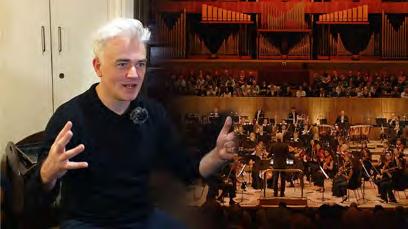


Marquee TV is the official streaming partner of the London Philharmonic Orchestra.
With a carefully curated selection of performances from the world’s leading arts organisations, Marquee TV is your key to seeing more of what you love. Subscribe today and enjoy unlimited access to an extensive range of music, opera, jazz, theatre, dance and more. ‘An Alpine Symphony’ will be available to stream on demand from 30 March, alongside many more concerts from your favourite orchestras. For 50% off an annual subscription, scan the QR code or visit discover.marquee.tv/50lpo
Available online, on iOS and Android apps, Amazon Prime, Amazon Fire, Apple TV, Android TV, Comcast X1, Cox, Roku, and Samsung TV. Follow @MarqueeartsTV on Instagram, Facebook and X to stay up to date on the latest launches.


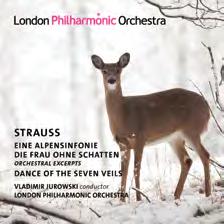

Strauss An Alpine Symphony Dance of the Seven Veils (from Salome) Die Frau ohne Schatten (orchestral excerpts)
Vladimir Jurowski conductor London Philharmonic Orchestra
LPO-0106
‘Jurowski’s Alpine Symphony is ideally paced and beautifully balanced.’ ★★★★★ BBC Music Magazine

Available on CD from all good outlets, and to download or stream via all major platforms. Click to listen now or find out more.


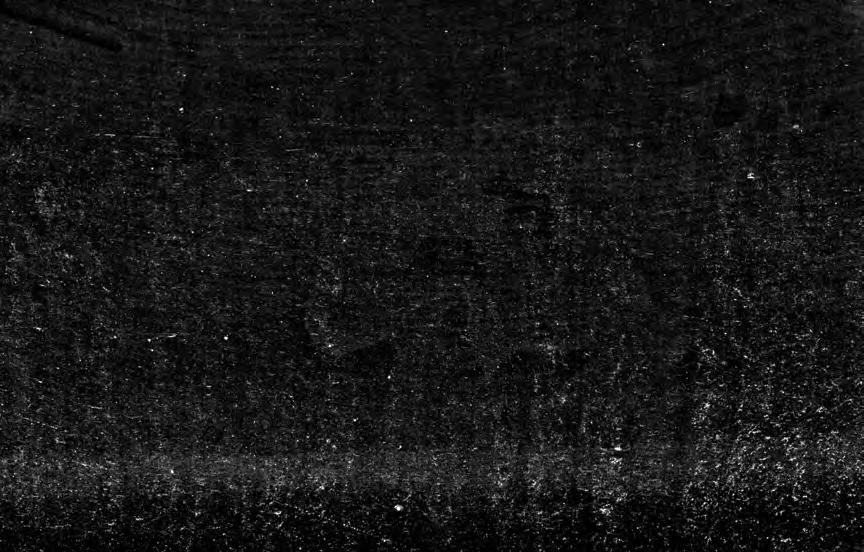


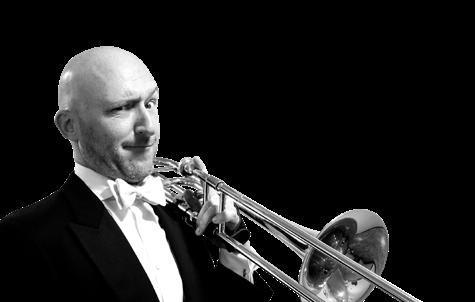
As a registered charity, we are extremely grateful to all our supporters who have given generously to the LPO over the past year to help maintain the breadth and depth of the LPO’s activities, as well as supporting the Orchestra both on and off the concert platform.
Anonymous donors
The American Friends of the London Philharmonic Orchestra
William & Alex de Winton
Catherine Høgel & Ben Mardle
Aud Jebsen
In memory of Mrs Rita Reay
Sir Simon & Lady Robey CBE
Orchestra Circle
Mr & Mrs Philip Kan
Neil Westreich
Associates
An anonymous donor
Mrs Irina Andreeva
Steven M. Berzin
Richard Buxton
Gill & Garf Collins
In memory of Brenda Lyndoe Casbon
In memory of Ann Marguerite Collins
Irina Gofman & Mr Rodrik V. G. Cave
Patricia Haitink
George Ramishvili
In memory of Kenneth Shaw
The Tsukanov Family
Mr Florian Wunderlich
Associates
In memory of Len & Edna Beech
Sir Nigel Boardman & Prof. Lynda Gratton
The Candide Trust
Stuart & Bianca Roden
In memory of Hazel Amy Smith
An anonymous donor
David & Yi Buckley
Dr Alex & Maria Chan
In memory of Allner Mavis Channing
In memory of Peter Coe
Michelle Crowe Hernandez
Gini Gabbertas
Jenny & Duncan Goldie-Scot
Mr Roger Greenwood
Malcolm Herring
Julian & Gill Simmonds
Mr Brian Smith
Mr Jay Stein
Eric Tomsett
The Viney Family
Guy & Utti Whittaker
David Burke & Valerie Graham
Clive & Helena Butler
John & Sam Dawson
Ulrike & Benno Engelmann
Fiona Espenhahn in memory of Peter
Luke Gardiner
Prof. Erol & Mrs Deniz Gelenbe
The Jeniffer & Jonathan Harris
Charitable Trust
Iain & Alicia Hasnip
John & Angela Kessler
Mrs Elizabeth Meshkvicheva
Dr Irene Rosner David
Tom & Phillis Sharpe
Jenny Watson CBE
Laurence Watt
Anonymous donors
Chris Aldren
Michael Allen
Alexander & Rachel Antelme
Annie Berglof
Nicholas Berwin
Lorna & Christopher Bown
Mr Bernard Bradbury
Richard & Jo Brass
Desmond & Ruth Cecil
Mr John H Cook
Emmanuelle & Thierry d’Argent
Mrs Elizabeth Davies
Guy Davies
Cameron & Kathryn Doley
Ms Elena Dubinets
David Ellen
Cristina & Malcolm Fallen
Mr Daniel Goldstein
David & Jane Gosman
Mr Gavin Graham
Mrs Dorothy Hambleton
Eugene & Allison Hayes
J Douglas Home
Mr & Mrs Jan
Mr & Mrs Ralph Kanza
Mrs Elena Kolobova & Mr Oleg
Kolobov
Rose & Dudley Leigh
Wg. Cdr. M T Liddiard OBE JP RAF
Drs Frank & Gek Lim
Andrew T Mills
Mr & Mrs Andrew Neill
John Nickson & Simon Rew
Peter Noble & Lucy Vella
Mikhail Noskov & Vasilina Bindley
Simon & Lucy Owen-Johnstone
Andrew & Cindy Peck
Mr Roger Phillimore
Nigel Phipps & Amanda McDowall
Mr Michael Posen
Marie Power
Sir Bernard Rix
Baroness Shackleton
Tim Slorick
Sir Jim Smith
Mrs Maria Toneva
Mr Joe Topley & Ms Tracey Countryman
Mr & Mrs John C Tucker
Andrew & Rosemary Tusa
Galina Umanskaia
Mr & Mrs John & Susi Underwood
The Viney Family
Mr Rodney Whittaker
Grenville & Krysia Williams
Joanna Williams
Anonymous donors
Julian & Annette Armstrong
Chris Banks
Mr John D Barnard
Roger & Clare Barron
Mr Geoffrey Bateman
Mrs A Beare
Chris Benson
Peter & Adrienne Breen
Dr Anthony Buckland
Mr Julien Chilcott-Monk
David & Liz Conway
Mr Alistair Corbett
David Devons
Deborah Dolce
In memory of Enid Gofton
Prof Emeritus John Gruzelier
Mrs Farrah Jamal
Bruce & Joanna Jenkyn-Jones
Per Jonsson
Tanya Joseph
Mr Ian Kapur
Jozef & Helen Kotz
Dr Peter Mace
Peter Mainprice
Miss Rebecca Murray
Mrs Terry Neale
Mr Stephen Olton
Mr James Pickford
Neil & Karen Reynolds
Mr Robert Ross
Kseniia Rubina
Mr Andrea Santacroce & Olivia
Veillet-Lavallée
Penny Segal
Priscylla Shaw
Michael Smith
Erika Song
Mr & Mrs G Stein
Dr Peter Stephenson
Ben Valentin KC
Sophie Walker
Christopher Williams
Liz Winter
Elena Y Zeng
Anonymous donors
Ralph & Elizabeth Aldwinckle
Robert & Sarah Auerbach
Dr Simona Cicero & Mr Mario Altieri
Alison Clarke & Leo Pilkington
Sarah Connor
Miss Tessa Cowie
Andrew Davenport
Stephen Denby
Mr Simon Edelsten
Steve & Cristina Goldring
In memory of Derek Gray
Nick Hely-Hutchinson
The Jackman Family
Molly Jackson
Jan Leigh & Jan Rynkiewicz
Mr David MacFarlane
Simon Moore
Simon & Fiona Mortimore
Dana Mosevicz
Dame Jane Newell DBE
Diana G Oosterveld
Mr David Peters
Mr & Mrs Graham & Jean Pugh
Clarence Tan
Tony & Hilary Vines
Dr June Wakefield
Mr John Weekes
Mr Roger Woodhouse
Mr C D Yates
Elliott Bernerd
Alfonso Aijón
Carol Colburn Grigor CBE
Pehr G Gyllenhammar
Robert Hill
Keith Millar
Victoria Robey CBE
Mrs Jackie Rosenfeld OBE
Cornelia Schmid
Timothy Walker CBE AM
Laurence Watt
Group
Sir Nigel Boardman & Prof. Lynda Gratton
David & Yi Buckley
In memory of Peter Coe
Dr Alex & Maria Chan
Garf & Gill Collins
William & Alex de Winton
The Friends of the LPO
Irina Gofman & Mr Rodrik V. G.
Cave
Mr Roger Greenwood
Barry Grimaldi
David & Bettina Harden
Mr & Mrs Philip Kan
Mr & Mrs John Kessler
Sir Simon Robey
Victoria Robey OBE
Stuart & Bianca Roden
Julian & Gill Simmonds
Eric Tomsett
Neil Westreich
Guy & Utti Whittaker
Principal
Bloomberg
Carter-Ruck Solicitors
French Chamber of Commerce
Natixis Corporate & Investment
Banking
Ryze Power
Tutti
German-British Chamber of Industry & Commerce
Lazard
Walpole
Preferred Partners
Jeroboams
Lindt & Sprüngli Ltd
Mayer Brown
Neal’s Yard Remedies
OneWelbeck
Sipsmith
Steinway & Sons
In-kind Sponsor
Google Inc
ABO Trust
Art Mentor Foundation Lucerne
BlueSpark Foundation
The Boltini Trust
Candide Trust
Cockayne Grants for the Arts in London
The David Solomons Charitable Trust
Dunard Fund
Ernst von Siemens Music
Foundation
Foyle Foundation
Garfield Weston Foundation
Garrick Charitable Trust
The Golsoncott Foundation
Jerwood Foundation
John Coates Charitable Trust
John Horniman’s Children’s Trust
John Thaw Foundation
Idlewild Trust
Institute Adam Mickiewicz
Kirby Laing Foundation
The John S Cohen Foundation
The Lennox Hannay Charitable Trust
Kurt Weill Foundation
Lord and Lady Lurgan Trust
Lucille Graham Trust
The Marchus Trust
Maria Bjӧrnson Memorial Fund
The 29th May 1961 Charitable Trust
PRS Foundation
The R K Charitable Trust
The Radcliffe Trust
Rivers Foundation
Rothschild Foundation
Scops Arts Trust
Sir William Boreman’s Foundation
TIOC Foundation
Vaughan Williams Foundation
The Victoria Wood Foundation
The Viney Family
The Barbara Whatmore Charitable Trust
and all others who wish to remain anonymous.
We are grateful to the Board of the American Friends of the London Philharmonic Orchestra, who assist with fundraising for our activities in the United States of America:
Hannah Young Chair
Kara Boyle
Jon Carter
Jay Goffman
Alexandra Jupin
Natalie Pray MBE
Damien Vanderwilt
Marc Wassermann
Elizabeth Winter
Catherine Høgel Hon. Director
Natasha Tsukanova Chair
Mrs Irina Andreeva
Steven M. Berzin
Shashank Bhagat
Irina Gofman
Olivia Ma
George Ramishvili
Florian Wunderlich
We are grateful to the following donors for their generous contributions to our Sound Futures campaign. Thanks to their support, we successfully raised £1 million by 30 April 2015 which has now been matched pound for pound by Arts Council England through a Catalyst Endowment grant. This has enabled us to create a £2 million endowment fund supporting special artistic projects, creative programming and education work with key venue partners including our Southbank Centre home. Supporters listed below donated £500 or over. For a full list of those who have given to this campaign please visit lpo.org.uk/soundfutures
Masur Circle
Arts Council England
Dunard Fund
Victoria Robey OBE
Emmanuel & Barrie Roman
The Underwood Trust
Welser-Möst Circle
William & Alex de Winton
John Ireland Charitable Trust
The Tsukanov Family Foundation
Neil Westreich
Tennstedt Circle
Valentina & Dmitry Aksenov
Richard Buxton
The Candide Trust
Michael & Elena Kroupeev
Kirby Laing Foundation
Mr & Mrs Makharinsky
Alexey & Anastasia Reznikovich
Sir Simon Robey
Bianca & Stuart Roden
Simon & Vero Turner
The late Mr K Twyman
Solti Patrons
Ageas
John & Manon Antoniazzi
Gabor Beyer, through BTO
Management Consulting AG
Jon Claydon
Mrs Mina Goodman & Miss Suzanne Goodman
Roddy & April Gow
The Jeniffer & Jonathan Harris
Charitable Trust
Mr James R.D. Korner
Christoph Ladanyi & Dr Sophia Ladanyi-Czernin
Robert Markwick & Kasia Robinski
The Maurice Marks Charitable Trust
Mr Paris Natar
The Rothschild Foundation
Tom & Phillis Sharpe
The Viney Family
Haitink Patrons
Mark & Elizabeth Adams
Dr Christopher Aldren
Mrs Pauline Baumgartner
Lady Jane Berrill
Mr Frederick Brittenden
David & Yi Yao Buckley
Mr Clive Butler
Gill & Garf Collins
Mr John H Cook
Mr Alistair Corbett
Bruno De Kegel
Georgy Djaparidze
David Ellen
Christopher Fraser OBE
David & Victoria Graham Fuller
Goldman Sachs International
Mr Gavin Graham
Moya Greene
Mrs Dorothy Hambleton
Tony & Susie Hayes
Malcolm Herring
Catherine Høgel & Ben Mardle
Mrs Philip Kan
Rehmet Kassim-Lakha de Morixe
Rose & Dudley Leigh
Lady Roslyn Marion Lyons
Miss Jeanette Martin
Duncan Matthews KC
Diana & Allan Morgenthau
Charitable Trust
Dr Karen Morton
Mr Roger Phillimore
Ruth Rattenbury
The Reed Foundation
The Rind Foundation
Sir Bernard Rix
David Ross & Line Forestier (Canada)
Carolina & Martin Schwab
Dr Brian Smith
Lady Valerie Solti
Mr & Mrs G Stein
Dr Peter Stephenson
Miss Anne Stoddart
TFS Loans Limited
Marina Vaizey
Jenny Watson
Guy & Utti Whittaker
Pritchard Donors
Ralph & Elizabeth Aldwinckle
Mrs Arlene Beare
Mr Patrick & Mrs Joan Benner
Mr Conrad Blakey
Dr Anthony Buckland
Paul Collins
Alastair Crawford
Mr Derek B. Gray
Mr Roger Greenwood
The HA.SH Foundation
Darren & Jennifer Holmes
Honeymead Arts Trust
Mr Geoffrey Kirkham
Drs Frank & Gek Lim
Peter Mace
Mr & Mrs David Malpas
Dr David McGibney
Michael & Patricia McLaren-Turner
Mr & Mrs Andrew Neill
Mr Christopher Querée
The Rosalyn & Nicholas Springer Charitable Trust
Timothy Walker CBE AM
Christopher Williams
Peter Wilson Smith
Mr Anthony Yolland
and all other donors who wish to remain anonymous
Dr Catherine C. Høgel Chair
Nigel Boardman Vice-Chair
Mark Vines* President
Kate Birchall* Vice-President
Emily Benn
David Buckley
David Burke
Michelle Crowe Hernandez
Deborah Dolce
Elena Dubinets
Simon Estell*
Tanya Joseph
Katherine Leek*
Minn Majoe*
Tania Mazzetti*
Jamie Njoku-Goodwin
Neil Westreich
David Whitehouse*
*Player-Director
Advisory Council
Roger Barron Chairman
Christopher Aldren
Kate Birchall
Richard Brass
Helen Brocklebank
YolanDa Brown OBE
David Burke
Simon Burke
Simon Callow CBE
Desmond Cecil CMG
Jane Coulson
Andrew Davenport
Guillaume Descottes
Cameron Doley
Elena Dubinets
Lena Fankhauser
Christopher Fraser OBE
Jenny Goldie-Scot
Jonathan Harris CBE FRICS
Nick Hely-Hutchinson DL
Dr Catherine C. Høgel
Martin Höhmann
Jamie Korner
Andrew Neill
Nadya Powell
Sir Bernard Rix
Victoria Robey CBE
Baroness Shackleton
Thomas Sharpe KC
Julian Simmonds
Daisuke Tsuchiya
Mark Vines
Chris Viney
Laurence Watt
Elizabeth Winter
New Generation Board
Ellie Ajao
Peter De Souza
Vivek Haria
Rianna Henriques
Pasha Orleans-Foli
Zerlina Vulliamy
General Administration
Elena Dubinets
Artistic Director
David Burke
Chief Executive
Ineza Grabowska
PA to the Executive & Office Manager
Concert Management
Roanna Gibson
Concerts & Planning Director
Graham Wood
Concerts & Recordings Manager
Maddy Clarke
Tours Manager
Madeleine Ridout
Glyndebourne & Projects Manager
Alison Jones
Concerts & Artists
Co-ordinator
Dora Kmezić
Concerts & Recordings
Co-ordinator
Tom Cameron
Concerts & Tours Assistant
Matthew Freeman
Recordings Consultant
Andrew Chenery
Orchestra Personnel Manager
Helen Phipps
Orchestra & Auditions Manager
Sarah Thomas
Martin Sargeson
Librarians
Laura Kitson
Stage & Operations Manager
Stephen O’Flaherty
Deputy Operations Manager
Benjamin Wakley
Deputy Stage Manager
Finance
Frances Slack
Finance Director
Dayse Guilherme Finance Manager
Jean-Paul Ramotar
IT Manager & Finance Officer
Education & Community
Talia Lash
Education & Community Director
Lowri Davies
Eleanor Jones
Education & Community Project Managers
Claudia Clarkson Regional Partnerships Manager
Development
Laura Willis Development Director (maternity leave)
Olivia Highland Development Director (maternity cover)
Rosie Morden
Senior Development Manager
Eleanor Conroy
Development Events Manager
Owen Mortimer Corporate Relations Manager
Anna Quillin
Trusts & Foundations Manager
Al Levin
Development Co-ordinator
Holly Eagles Development Assistant
Nick Jackman
Campaigns & Projects Director
Kirstin Peltonen Development Associate
Marketing & Communications
Kath Trout
Marketing & Communications Director
Sophie Lonergan
Senior Marketing Manager
Georgie Blyth
Press & PR Manager
Josh Clark
Data, Insights & CRM Manager
Greg Felton
Digital Creative
Alicia Hartley
Digital & Marketing Manager
Gavin Miller
Sales & Ticketing Manager
Rachel Williams
Publications Manager
Isobel Jones
Marketing Co-ordinator
Archives
Philip Stuart Discographer
Gillian Pole
Recordings Archive
Professional Services
Charles Russell Speechlys Solicitors
Crowe Clark Whitehill LLP Auditors
Dr Barry Grimaldi
Honorary Doctor
Mr Chris Aldren
Honorary ENT Surgeon
Mr Simon Owen-Johnstone
Hon. Orthopaedic Surgeon
London Philharmonic Orchestra
89 Albert Embankment
London SE1 7TP
Tel: 020 7840 4200
Box Office: 020 7840 4242
Email: admin@lpo.org.uk lpo.org.uk